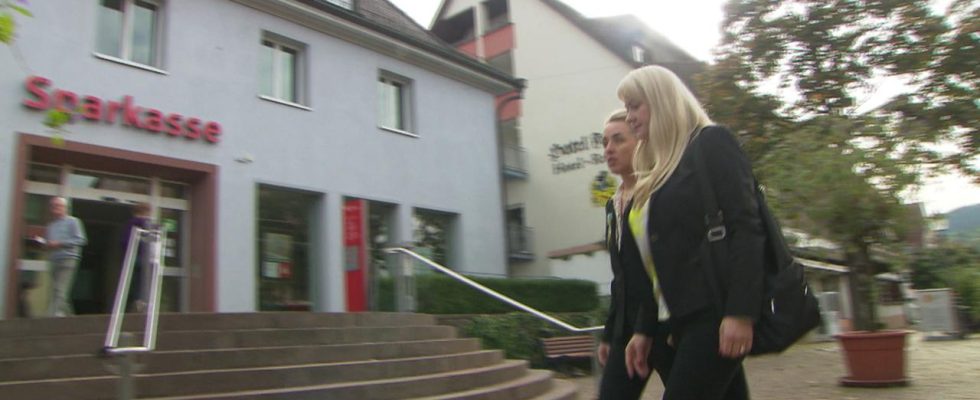Well trained and highly motivated – many refugees from Ukraine want to work quickly. However, they often encounter bureaucratic hurdles. A savings bank in the Black Forest shows that there is another way.
When Kateryna Danylenko and Ganna Robak walk to the Sparkasse Hochschwarzwald in Kirchzarten in their black pantsuits, you might think that the two of them already worked here. In any case, they would have sufficient professional experience.
“In Ukraine I worked in a well-known bank for twelve years, I was the chief accountant in this bank and I really like this job,” says Robak. Danylenko would also like to work in a bank again; she was initially a credit specialist in Ukraine, then she was promoted to regional director. “My heart bleeds for Ukraine. But we have to build a future here.”
That’s why the two of them go to a special course in Kirchzarten twice a week to learn the technical language and something about German banking. “We learn all the technical terms, such as profitability analysis, assessment of risk potential, and preparation of credit decisions,” explains Danylenko.
Most have one academic degree
Many of the more than a million Ukrainians who have fled to us are highly qualified, like the two women. According to a current analysis by the Institute for Labor Market and Occupational Research (IAB), 68 percent of refugees of working age have college or university degrees, and another 16 percent have vocational qualifications.
There is a massive shortage of skilled workers in Germany, which is actually a great opportunity. But just 19 percent of those who fled here found work, according to an analysis by the Friedrich Ebert Foundation. In countries like Poland, the Czech Republic and Denmark it is two thirds or more.
Since October 2022, the proportion of employed people here has increased by just one percentage point, despite the above-average training and the high demand for workers. In Denmark, on the other hand, 77 percent of Ukrainian war refugees have already found paid employment, according to the analysis.
Work as the key to integration
The low work participation is worrying, says Dietrich Thränhardt, author of the analysis. And it’s not just because of the wasted labor: “Work is a key to integration. When you earn your own money, you gain self-confidence and respect, have contacts on the same level and therefore learn the language faster,” is the belief of the professor emeritus Political Science.
That’s exactly how Robak experienced it: “When I came here at the beginning, I was like nothing. No language, no work, no money.” She no longer lives at the campsite in Kirchzarten, but in a house with other Ukrainians. She learned German intensively and had great hopes of getting a job thanks to the special course.
But work often fails due to high bureaucratic hurdles. In Poland only five percent complain about this, in Germany 49 percent. According to the analysis by the Friedrich Ebert Foundation, several steps are necessary before starting work, which causes delays and difficulties in orientation, and the different offices each require processing times.
Special course thanks to their own initiative – Kateryna Danylenko and Ganna Robak hope that they will now quickly find permanent work.
initiative made the beginning
Robak and Danylenko don’t have the German authorities to thank for the course either. But their own initiative. Danylenko discovered the Russian-speaking association “Wesna” on Facebook, which organized a meeting for Ukrainian refugees – with the aim of better integrating them.
The director in Freiburg is Irina Friedemann. The Russian used to be a management consultant and now works at Sparkasse Hochschwarzwald. “I have been here for 32 years and my mission is to get Russian-speaking, well-educated women into the primary labor market.”
The Ukrainians accompanied Friedemann to a Christmas singing event at the Sparkasse Hochschwarzwald in Kirchzarten. There they started talking to their colleague Wolfgang Göldner. When he heard that one of the women was an accounting specialist, he immediately showed her the bank.
“Accounting experts aren’t exactly rushing into our place,” he says. Together with his colleague Friedemann, he developed the idea for the special course, and it started at the beginning of April.
Better to work instead of social benefits
The participants have all already learned a lot, says Göldner. Because they are motivated, ambitious and on task, they will also accept longer journeys – anything in order to learn. Ukrainians would rather work than receive social benefits, as Thränhardt’s study also confirms.
Similar few Ukrainians work in Austria and Switzerland as in Germany, although social benefits are much lower, sometimes below the subsistence level. The decisive factor is obviously not the level of supply, but the flexibility or cumbersomeness of the administration, says Thränhardt. He thinks the Sparkasse’s course is right on target. “In the gap between insufficient language skills, high motivation and good Ukrainian education.”
Came to stay
The bank specialists from Kirchzarten are now also taking part in trainee training courses, and the Sparkasse is trying to arrange internships in various departments. The Wesna association supports you with applications. Kateryna Danylenko came with her adult son, Ganna Robak with her two children. They both had to leave their husbands and parents behind, but want to stay in Germany permanently.
Robak says: “I want my children to be able to continue to live in peace in Germany.” The two banking specialists already have a work permit, the course prepared them, now they just need a job. Maybe soon in the Sparkasse Hochschwarzwald.

